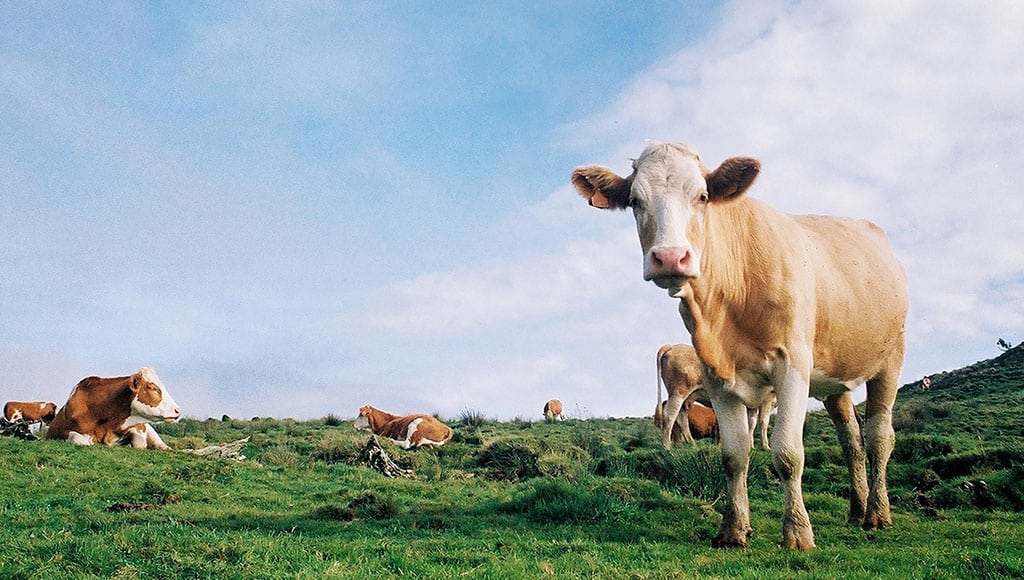When I first dreamed of moving to Portugal, I was driven by a desire to leave the rat race, as many seem to be who fall in love with Portugal’s interior and its charming rural culture. Staying with rodent metaphors, it’s fair to say I’ve done a lot to get off the hamster wheel but haven’t quite dispensed with the cage entirely.
The idea my wife Louisa and I had to grow food, grow kids and grow old together in central Portugal has, since we arrived here in 2017, been a harder dream to realise than we originally imagined.
As the years have passed, and boy have they passed quickly, now with a third child and both of us launching businesses, the magnetic effect of normality has had us default into more of a pleasant suburban life than the rural idyll we used to regularly fantasise about.
Where some couples have fantasies that start and end in the bedroom, ours began on the sofa and ended on the allotment. And still, we sense the juggernaut of modern civilisation is heading nowhere fast and, mixing even more metaphors, entertain even now the urge to ‘jump ship’.
We’re certainly not, I am sure, alone in this perversion, this rejection of normality, by which I mean the forty-ish-year plan that starts at the end of school, climaxes in retirement and has an assault course in the middle through which wealth, status and security are obtained. For increasing numbers, the assault course has become overly arduous, pushing the third and final stage ever further into the future, or making it too short or low in vitality to really enjoy.
That was not the life, or a cost of living, we were up for and so took a chance on Portugal, when redundancy in the UK offered the push we needed. Not so much rich retirees, more economic migrants, we came, we saw, but have yet to conquer the treadmill that was so unattractive and inevitable in our country of origin. Sure, we have a much better quality of life, and for that we are so grateful to this country, its people and its culture, but the ‘Good Life’ we once envisaged, and I first tasted in 2007, remains elusive.
On that first trip to Portugal, suggested during a chance conversation about my ideas to abandon the UK for France or Spain, I came to the interior – in the rolling hills way east of Coimbra – to interview some organic farmers, and indulge my curiosity. I recall eating fresh, home-grown fruit and veg, alfresco, in a very pleasing near-steamy heat, and was immediately taken by the rural magic and bucolic splendour.
During a life-changing few days, I was to see my first firefly as I stumbled in the dark trying to find my yurt, and was awoken, and enchanted, by the distant calls of a roaming goat herder, a sound recording I still have in pride of place among those fruitful podcast interviews with my hosts and the other volunteer guests. From all over the world, and from all walks of life, they too were delighted by the intense simplicity and joyful timelessness of life here, albeit shocked by the composting toilet.
“I’ll take it!” I thought, seeing a lifestyle I could adjust to and prepare for, which would still take another 10 years to realise. The rest is history, as here we are, the downshifting Brits with three kids, who are still seeking that fertile soil, metaphorical and actual, to complete the picture that was, and still is, our ‘dream board’.
I blame no one for this predicament. “It is what it is,” as people often say when uncomfortable yet resigned about their fate. Yet, it’s unlikely we’ll rest until we truly feel at home, in our home in the countryside, replete with natural abundance, that brings all the pieces of our long-held dream together. And it’s not that we haven’t tried, experimenting in food-growing in both soil and hydroponically, chicken and quail keeping, and endeavours in communal and collaborative living in various parts of Portugal.
It’ll take some continued and lateral thinking to get this family shifted further from the default fast lane of the dominant consumer society and down a couple of gears into the intentional country lane of life. The ‘traditional’ models of getting off the grid, both economically and psychologically, are to either amass wealth and do it gracefully, or jump anyway and live like a pauper. Roughly speaking, the options look like either hermetic castles of bunkered self-sufficiency or hand-painted recycled tyre-clad communes, neither of which have mass appeal or sustainable likelihood.
These caricatures, of course, are stark and comic, but they do highlight and illustrate the economic system, as well as the property and land ownership context, from which they are born. That most simple and common sensical of propositions – living on, and feeding your family, from the land; land which is plentiful and fertile here – has been rendered near impossible economically, though increasingly desirable and sensible to anyone who gives it a second thought.
What then might it take to have people have access to the means of production of food, and perhaps the husbandry of livestock – that is to say the land upon which this blessed work can take place – that does not render them impoverished or unsustainable in the process, or unable to even begin in that endeavour, for lack of funds?
As incredible and simply bonkers this societal predicament is, it’s made no more palatable or excusable by the obvious availability of growing space as well as willing and visionary growers in Portugal, not to mention the hungry, whose numbers appear to increase in every new poverty-revealing survey.
Newsflash: access to land need not be ownership of land. All that’s required is a mental shift that facilitates the marriage of those with too much land to manage, and those who would like to work it, given the opportunity. When I raised this very idea on my social media timeline recently, plainly asking the question, “Quinta and rural homeowners in Portugal: please let me know if you are interested in leasing your land for 5+ years”, friends responded positively.
“I’ve often thought of all that land out there that people own and fail to tend or take care of, that could be earning a revenue and producing real food for at least two different families and reducing the worry for owners. Win-win for all,” said one, a Brit in central Portugal.
“A lot of it is due to Portugal’s inheritance laws, and the fact that so many property heirs live outside the country makes it even worse. There must be tens, if not hundreds, of thousands of properties that are entangled in webs of multiple heirs, often crossing generations, who cannot agree on what to do with their properties,” added another, Tony of Portuguese heritage in Canada, throwing some light on the origins of mass abandonment in the interior.
Surely what’s needed is a dating site that sources and hooks up the owners of uncared-for land with those unable to access growing space, for whatever reason. And as city life looks more and more precarious in a country with such a rich rural tradition, we might be onto something. Something we might call ‘Terramor’, the plenty of fish for land lovers!
By Carl Munson
Carl Munson is host of the Good Morning Portugal! show every weekday on YouTube and creator of www.learnaboutportugal.com, where you can learn something new about Portugal every day!





















